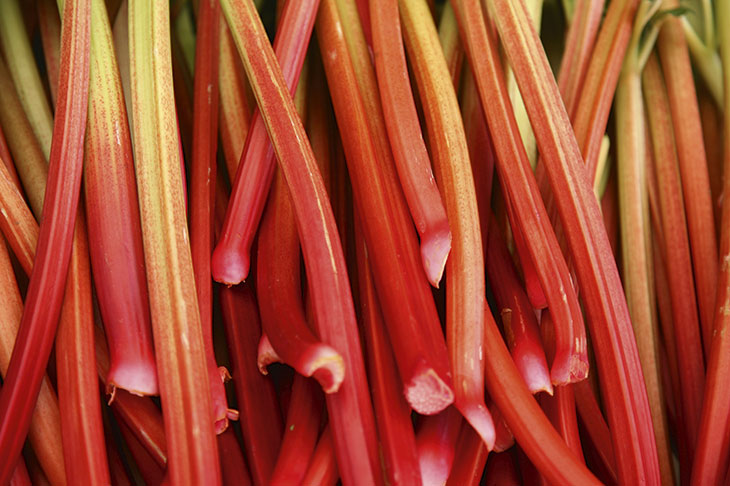The tale of forced Yorkshire rhubarb has the makings of a David Lean film. Frosty Slavic beginnings, wartime devotion, steam trains. Rhubarb was brought to Britain from Siberia towards the end of the 17th century, and it’s hard to imagine a more eccentrically British fruit — though technically it is of course a vegetable.
The curious method of ‘forcing’ rhubarb to make it fruit early wasn’t discovered until January 1817, when gardeners digging a trench inadvertently buried some rhubarb crowns in soil. Uncovered, it would have taken until Easter for these crowns to show any signs of growth. One can imagine the gardeners’ surprise when, a fortnight later, bright pink stalks emerged.
Half a century on, rhubarb took root in the area now known as the Yorkshire Triangle. Waste wool from the mills fed nitrogen into the soil, the Pennines created the perfect wet, cold microclimate, and the nearby coalfields provided fuel to heat 200 forcing sheds. By the 1940s, rhubarb crates were sent from Leeds to London on their own daily sleeper train, the price strictly controlled by the government to ensure that the precious stalks remained affordable for every household.
Yet with the end of rationing came the fall of the rhubarb empire. Renewed overseas trade brought in an array of exotic new fruits, diminishing demand. The train was cancelled, the market price fell, and over the next ten years the number of growers dropped to the dozen that remain today. Looking across the Yorkshire Triangle now, the forcing sheds have all but disappeared, replaced by industrial estates and supermarkets.
But there are still some families who cling on — the likes of Tomlinson, Oldroyd, Westwood. These are fourth and even fifth generations of forced rhubarb growers. Tomlinson is even using the same crowns; his family divide the roots each year and save some for the next season’s planting. From January to early April, the growers spend all day bent double, hand-picking each stalk by candlelight to eliminate any chance of photosynthesis, which would render the tender, pink stalks tough and green.
Today, perhaps the rhubarb we see most often springs from another great British institution: the allotment. Out of the forcing sheds, outdoor rhubarb has lost its deep pink lustre but is a sturdy backbone to the vegetable patch, requiring little work to crop steadily from early April to mid July. Generations of British children have grown up with rhubarb crumble on Sundays.
But rhubarb never quite made it back to mainland Europe. Its stringy texture and bittersweet flavour baffles continental cooks. When I lived in Rome, I took some back in my hand luggage as a treat for my fellow chefs. One took a bite from the raw stalk, and point blank refused to ever try the ‘acido, strano’ stuff again.
The British appetite for rhubarb is on the rise, though. In 2010 forced rhubarb gained a Protected Designation of Origin stamp from the EU, an honour bestowed on the likes of Champagne and Parma ham. When Robert Tomlinson took over the rhubarb business from his father in the early Noughties, they were down to two forcing sheds. With the surge in popularity over the past ten years — due in part to a popular Delia recipe — he has just reopened his fourth.






Comments